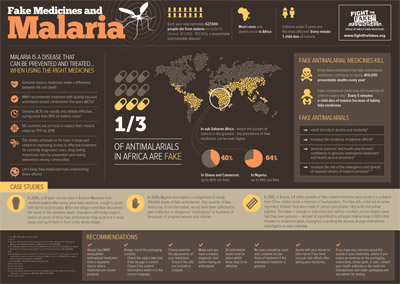Latest News
13-Oct-2015Minilab Capacity Building in Angola
Twenty-two staff from the Angolan medicine regulatory authority, drug inspectorate, central medical store and the national malaria programme completed a training on the use of the Minilab basic tests and the operational framework for implementing a nationwide drug quality monitoring programme in Luanda, the capital of Angola, last week. For more information please see here.
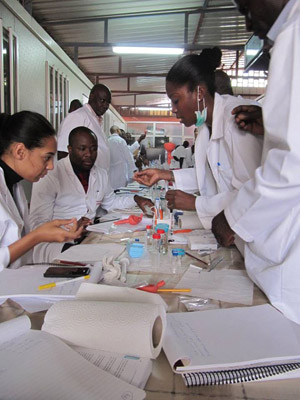
Minilab training course in Lunada, Angola.
11-Sep-2015
Minilab Workshop in Tanzania
Since 2014 the GPHF has a particularly strong engagement in Tanzania to improve pharmaceutical service. Apart from the donation of four Minilabs to pharmaceutical schools in Tanzania, a special workshop for the teachers of these schools was conducted now in Dar es Salaam. The workshop, focused on the proper use of the Minilab to protect consumers against the use of poor-quality and falsified medicines, was led by GPHF-Project Manager Dr. Richard Jähnke. The engagement of the GPHF in Tanzania is part of a public-private development partnership between the Tanzanian public health authorities and the German agency for international cooperation (GIZ) together with the pharmaceutical companies Bayer, Boehringer Ingelheim and Merck. For more information please see here.
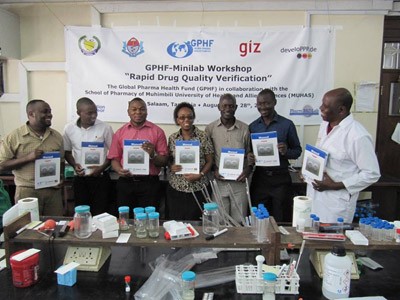
11-Aug-2015
The use and need for GPHF-Minilabs
Recently, the concept and performance of the GPHF-Minilab was challenged twice. One study assessed the capabilities of countries in the East African Union to perform and manage post-marketing medicines quality studies overall and another study verified the quality of antimalarial medicines sold in the Gabonese retail market. In the first study sponsored by the federal agency for physical testing in Germany, a general implementation of GPHF-Minilabs to compliment the work of existing national drug quality control laboratories, or to start testing first time, is much desirable and runs like a red thread through the entire paper. A direct confirmation that GPHF-Minilabs are able to deliver promptly reliable data for post-marketing surveillance studies was then obtained by using them in Gabon. According to this study, the good news is that the prevalence of poor-quality anti-malarial drugs is far lower than anticipated and the bad news is that if fake anti-malarial pills were found they contained little more than starch and were truly fatal when consumed by patients suffering malaria.
13-Jul-2015
No positive shift on counterfeit drugs
Based on an investigation in 115 countries worldwide INTERPOL once again confirmed that counterfeit medicines are a global issue. The operation focused on the illicit sale of medicines and medical devices promoted and sold via the Internet. A record number of medicines worth about an 81 million US dollars have been seized. French authorities named the growing number of counterfeit drugs “a silent epidemic” and issued a very informative publication on this matter.
02-Jun-2015
GPHF-Minilab™: First training in Afghanistan
For the first time a training course on the GPHF-Minilab™ took place in Afghanistan. The training was carried out by Management Sciences for Health (MSH) in cooperation with Afghanistan’s Ministry of Public Health. For more information please see here.
13-May-2015
100.000 children die due to fake medicines
According to recent information of the American Journal of Tropical Medicne and Hygiene over a 1000.000 children annually die on the consumption of counterfeit antimalarial medicines containing the wrong, to little or no active pharmaceutical ingredient. Alreday in April the magazine published a global study on fake medicines. For more information please see here.
15-Apr-2015
Further six Minilabs for Ethiopia
Shortly, six more GPHF-Minilabs will go to Ethiopia in East Africa. They will complement the work of the national medicines control authority and are donated by the “Promoting the Quality of Medicines” programme run jointly by USP (United States Pharmacopeial Convention) and USAID. After their arrival, the Minilabs will be disseminated to several regional drug control offices and thus help in reducing the workload on the central level. Since ten years, USP and GPHF are partnering in their fight against counterfeit medicines. For example, last year, GPHF Project Manager Dr. Jähnke supported the ongoing efforts and run an extra Minilab training course in the country. Globally, in the past ten years, the USP/USAID “Promoting the Quality of Medicines” programme donated 180 Minilabs already.
31-Mar-2015
Friederike Segeberg new chairperson of the GPHF
At the annual meeting of the Global Pharma Health Fund (GPHF) Friederike Segeberg was elected as the new chairperson of the charitable organization. She succeeds Frank Gotthardt, who now serve as Vice Chairman besides Dr. Walter Huber. The board of the GPHF is completed by Treasurer Stefan D. Schröder.
17-Mar-2015
GPHF-Minilab™ identifies fake malaria pills in Malawi
Due to the GPHF-Minilab™ counterfeit antimalarial medicines were identified in Malawi. Sold by illegal street vendors the falsified products contained none of the declared active pharmaceutical ingredient. These counterfeit medicines represent a serious health risk to the Malawian population. For more information please see here.

Fake malaria pills identified by the GPHF-Minilab™ in Malawi.
12-Mar-2015
GPHF-Minilabs for Tanzania
For the advancement of pharmaceutical services in Tanzania, the German association of researched-based pharmaceutical manufacturers announced a trio partnership among some of their member companies, the public German International Cooperation and the faith-based development sector in Berlin this week. The Minilab developed by the Global Pharma Health Fund (GPHF) will play an essential part of the vocational capacity building project for pharmaceutical technicians. It will help in assuring access to quality medicines even in rural Tanzania and protect consumers against the use of poor-quality and falsified medicines. The dispatch of four Minilabs is combined with an appropriate training at the Muhimbili University of Health and Allied Sciences in Tanzania’s capital Dar es Salaam.
23-Feb-2015
Minilab training in Burundi
Onset February this year, more than ten people have been trained in the use of the Minilab at the LifeNet health care centre of Bujumbura (Burundi). The training was run by Nyaah Ngoh Fidelis, a pharmacist from the health service of the Presbyterian Church in Cameroon. The Minilab was donated by the German Institute for Medical Mission, a faith-based organisation run by Protestant doctors in Tübingen. For more information please see here.
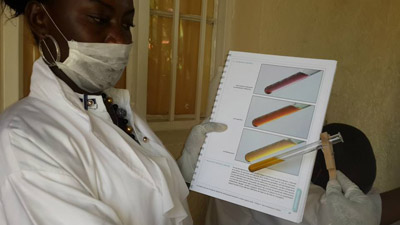
The Minilab manual shows the way to proceed.
20-Jan-2015
Minilab Method Extension: Five more test protocols supplied
The Minilab’s method inventory has now been extended to overall 75 drug compounds. New and old Minilab users will clearly benefit from this performance improvement, for example the identification and content verification of more essential cardiovascular medicines. Appropriate reference standards are supplied. Beyond this, the Minilab’s technical platform stays unchanged and can fully manage the new five arrivals atenolol, bisoprolol, captopril, hydrochlorothiazide and clomifene. The new supplements are available in English, French and Spanish. For more information please see here.
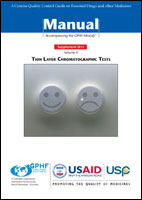
The new supplements are available
in English, French and Spanish.
15-Jan-2015
E-learning course on fake medicines
The Institute of Research Against Counterfeit Medicines (IRACM) is now offering an e-learning programme on fake medicines helping consumers to understand the difference between falsified, counterfeit and substandard medicines permanently floating the global markets in disturbing quantities. With every passing day, men, women and children, even yourself and family members can become a victim of counterfeit medicines. Increase your knowledge, get protected and start the training now at www.iracm.com/elearnlanding/en.
08-Dec-2014
GPHF donates minilabs to Madagascar
To prevent people from counterfeit drugs the GPHF once again donated two of his minilabs, this time to Madagascar. The picture shows GPHF Chairman Frank Gotthardt (right) during the handing-over of the minilabs to the Malagasy Prime Minister Roger Kolo (centre) being also the Minister of Health in the country. For more information please see here.
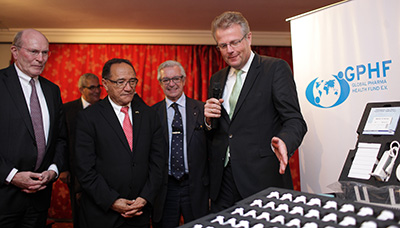
02-Dec-2014
Minilab course in Ethiopia
In Ethiopia, last week, fourteen more pharmacists have been trained in the use of the GPHF-MinilabTM. The course, done by the GPHF project manager Dr. Richard Jähnke, took place at the School of Pharmacy being part of the College of Health Sciences of Addis Ababa University (AAU). For more information please see here.
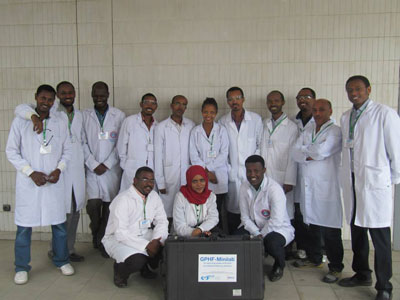
The participants of the GPHF-MinilabTM course in Ethiopia.
26-Nov-2014
One Year Anniversary of “Fight the Fakes” – Interpol warns about fake drugs
Today marks the one year anniversary of the Fight the Fakes campaign, initiated by the International Federation of Pharmaceutical Manufacturers & Associations (IFPMA). In the meantime the global awareness campaign against counterfeit drugs is supported by more than twenty international organisations including the GPHF. Under the motto “Speak about fake medicines” numerous activities have been carried out. For more information please visit www.fightthefakes.org
How important the struggle against the counterfeiting of medicines still is, has been recently demonstrated during an international meeting of Interpol in Dublin. It is reported that millions of people worldwide are affected by counterfeit drugs that threaten the healthcare systems of whole countries. In many cases the counterfeiting of drugs has become a part of the organized crime.
10-Oct-2014
Fake medicines galore found in a Bangladesh factory
The medicines market is flooded with a large number of spurious medical products in Bangladesh while traders take stock of ineffective regulation and lack of market monitoring. A well prepared police investigation lead to a joint drive by the health district administration and the Rapid Action Battalion (RAB) at a counterfeit drug factory in the Chittagong district end of last month recovering plenty of falsified medicines including their starting material to treat infections and other disorders.
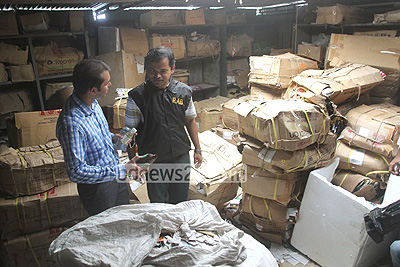
22-Sep-2014
Fake Medicines and Malaria
One third of the antimalarials in Africa are counterfeit and it has been estimated that fake antimalarial medicines contribute to nearly 450,000 preventable deaths per year. The international campaign Fight The Fakes, also supported by the GPHF, now published this descriptive infographic on these topics.
17-Sep-2014
Minilabs will support drug quality verification study in Malawi
The Global Pharma Health Fund (GPHF) contributes one of its Minilabs to a drug quality verification study in Malawi. Under the mentorship of Professor Lutz Heide from the University Tübingen, the study is designed to monitor the quality of antimalarial and antibacterial medicines circulating in the country and will be performed by the pharmaceutical institute of the University of Malawi based in Blantyre. Collaborators are Albert Petersen form the German Institute for Medical Mission and Dr. Richard Jähnke from the GPHF. A second GPHF-Minilab for this project will be donated by the University of Tübingen and a third one is already sitting at the Nkhoma Synod Health Department of the Central Africa Presbyterian Church.
02-Sep-2014
Obstacles to fight counterfeit medicines effectively
Using the GPHF-MinilabTM, a large quantity of counterfeit medicines were detected at the Luanda docks in Angola in June 2012. The tablets for the treatment of malaria and worm infections contained no or wrong active ingredients and over a million treatment packs of them were hidden in loudspeakers arriving in sea containers from China. How this case developed since then and what conclusion should be drawn from this case for the future is now discussed by an international team of experts including Dr. Richard Jähnke from the Global Pharma Health Fund (GPHF) in the September issue of The Lancet. See the full correspondence to the editor at “Falsified medicines in Africa: all talk, no action”.
12-Aug-2014
Minister joins Minilab training
Onset 2014, the Global Pharma Health Fund (GPHF) and the Promoting the Quality of Medicines (PQM) programme run by USP/USAID each provided one Minilab to the National Drug Quality Laboratory in Guinea-Conakry. Last month a Minilab introductory training for more than twenty people was performed. Even the Minister of Health, Médecin Colonel Dr. Remy Lamah, paid a visit to the lab. He highly spoke about the technical assistance given in fighting the menace of fake and substandard quality medicines known to circulate in the West African region. The training on the GPHF-Minilab was covered by the local TV station too.

Minister Lamah underlined the importance of the Minilab.
01-Jul-2014
Expanding antimalarial medicines quality monitoring in Kenya
In Kenya last week, six more counties have been equipped with Minilabs and twenty two more technicians been trained at the National Quality Control Laboratory and Pharmacy & Poisons Board in Nairobi by the ongoing antimalarial quality surveillance project run by the Promoting the Quality of Medicines programme (PQM) maintained jointly by USP and USAID. The technical briefing on the Minilab’s operational procedures was supported by the Global Pharma Health Fund. For more information please see here.
18-Jun-2014
Training on the GPHF-Minilab™ in India
Onset this month, five people including three doctors, one pharmacist and a senior manager have been trained on the use of the GPHF-MinilabTM at the Baptist Christian Hospital (BCH) in Tezpur, an Indian town in the Assam state near the Nepalese border. The training was conducted by the staff from the Community Development Medicinal Unit (CDMU) based in Odisha-Bhubanewar and the feedback on the training was excellent. Uncontrolled cross-border trading is immanent in the Tezpur region and the chance to see even falsified medicines is high. BCH Tezpur and CDMU Odisha are part of the Ecumenical Pharmaceutical Network using Minilabs developed by the Global Pharma Health Fund (GPHF) and donated by the German Institute for Medical Mission. Photo credit: BCH Tezpur.

Picture: BCH Tezpur
11-Jun-2014
Tons of fake medicines have been secured
During an international operation coordinated by INTERPOL more than 200 tons of fake and illicit medicines have been secured in West Africa. The market value of the confiscated goods was about 25 million US dollar. For more information go to http://www.interpol.int/News-and-media/News/2014/N2014-099
Once again the GPHF-Minilab™ has proved a reliable assistant to the local drug inspectors. Thanks to the mobile laboratory a fake antibacterial without the prescribed ingredient was detected in Cameroon.

Consfiscation of fake medicines in West Africa. Picture: INTERPOL.
06-Jun-2014
Eleven new partners join global Fight the Fakes campaign
Following the campaign’s six-month anniversary, Fight the Fakes announces eleven new partners, bringing the total number of member organizations to twenty-five. New partners, representing wholesalers, pharmacists, mobile app services, coalitions for consumer protection and generic pharmaceutical manufactures, join the campaign to speak up and spread the word about the devastating impact of fake medicines. These organizations add to a diverse group of standing partners, including healthcare professionals, disease-specific organizations, research-institutes, product-development partnerships, foundations, non-profits and the private sector, coordinating efforts in the fight against fake medicines.
The eleven new partners are the Alliance for Safe Online Pharmacies (ASOP), the Alliance for Safe Online Pharmacy in the EU (ASOP EU), the Center for Safe Internet Pharmacies (CSIP), the European Association of Pharmaceutical Wholesalers (GIRP), the Generic Pharmaceutical Association (GPhA), the International Federation of Pharmaceutical Wholesalers (IFPW), the International Pharmaceutical Students Federation (IPSF), Mobilium, the Partnership for Safe Medicines (PSM), PSM India and the Pharmaceutical Security Institute (PSI).
For more information please visit the website www.fightthefakes.org

